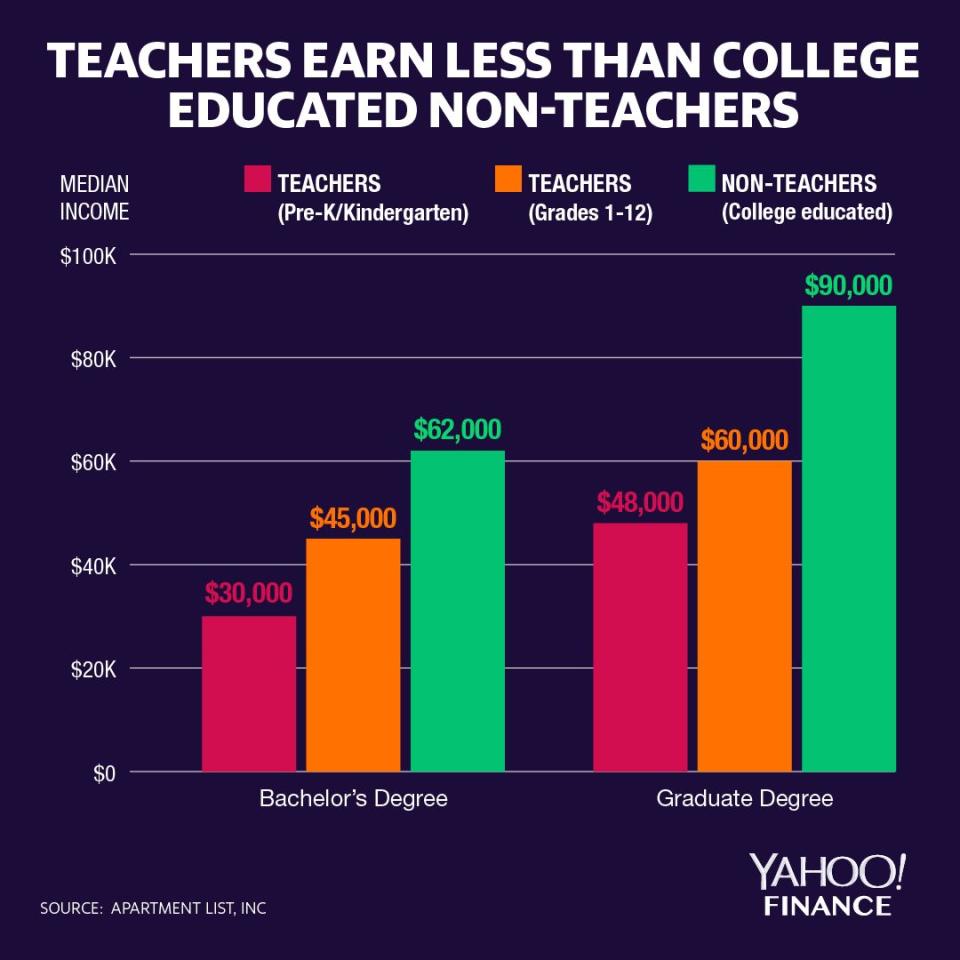U.S. teachers increasingly struggle to find affordable housing: Study
It’s often said that there’s a special place in heaven for teachers — but most U.S. teachers would settle for an affordable home. The struggle to find affordable housing is an issue that many Americans face, but a new study from housing economist Chris Salviati of Apartment List shows that U.S. teachers are shouldering a much heavier burden than non-teachers.
According to the study, the median income for pre-school and kindergarten teachers with Bachelor’s degrees is $30,000. That rises to $48,000 a year for those with graduate degrees. Teachers of grades 1 to 12 who hold Bachelor's degrees earn a median income of $45,000. Those teaching the same grades with a graduate degree earn $60,000.

That’s 27.4% less than non-teachers who hold Bachelor’s degrees — and the difference gets greater for those with a graduate-level education. Teachers with graduate degrees earn 33.3% less than similarly educated non-teachers.
Same education, less pay, less money for rent
As a result, teachers are increasingly burdened by their housing costs. “Nationally, 19.9% of primary-earner teachers are burdened by their housing costs. This is 21.3% higher than the cost-burden rate for households where the primary earner is a non-teacher with a college degree,” the study found. And this gap has widened over time; in 1990, the cost burden rate for teachers was 15% lower than that of college-educated non-teachers.
While teaching has long been a relatively low-paying profession, increases in housing costs have made it harder for teachers to get by. While rates of housing cost burden among teachers are lower than the national average, they are higher than that of other Americans with college degrees, and in certain parts of the country — particularly the country’s pricey coastal metros — teachers are especially strained.

Miami has the highest cost burden rate for teachers of the top 25 U.S. metro areas — 35% — followed by San Francisco, Los Angeles, San Diego, and Washington D.C.
Several of the top metro areas show large gaps between teachers and non-teachers. “Certain metros are really kind of off the charts,” said Salviati. “And it's kind of interesting that cities at the top, with the biggest gaps ... San Francisco, Denver, places that have really strong tech teams and the college educated non-teachers, you know you are in these kind of high-paying industries, but then Phoenix and Tampa also are at the top of the list there; those are places that have had solid economic growth recently, so certainly good opportunities for non-teachers, but those are also areas where teachers are just paid very poorly in comparison to other metros,” he said.

Working more for less
Teachers don't only have high-cost burden rates to contend with, educators must also spend money to keep their jobs in many states — a Master's degree is required for a permanent teaching license in 36 U.S. states and Washington, D.C.
"In a lot of professions really, having that extra level of education can be helpful, but in a lot of professions you can find a way without having it. Just a Bachelor's degree is sufficient in a lot of cases. Whereas with teachers ... in many places, you do need that graduate degree," Salviati said.
While some people try to justify teachers’ lower pay because they have “summers off,” the study found that teachers often work extra hours and over summer break. Between 1990 and 2017, the share of teachers who report working more than 50 hours per week increased by 43%, the share who report being at work during the summer increased by 46%, and the share who report working at least 50 weeks per year increased by 17%, the study found.
Teachers strikes and results
These economic conditions have led teachers in several states across the U.S. to take action in the form of strikes. In 2018-2019 teacher work stoppages have taken place in Arizona, Colorado, California, North Carolina, Oklahoma, and West Virginia, with varying outcomes. The Colorado teachers' strike ended in a 2% pay raise; the Los Angeles strike led to a 6% pay raise. The most significant victory was in Arizona, where striking teachers were awarded a 20% pay increase.
“Widespread teacher strikes and rising attrition rates point to the difficulty of living comfortably on a teacher’s salary,” said Salviati. “If not addressed, this issue may deter young educators away from the teaching profession, with significant negative implications for the quality of the American education system.”
Reggie Wade is a writer for Yahoo Finance. Follow him on Twitter at @ReggieWade.
Follow Yahoo Finance on Twitter, Facebook, Instagram, Flipboard,LinkedIn, and reddit.
Read more from Reggie:
New recycled Adidas sneaker is 'made to be remade'
Sneakers are now an emerging alternative asset class: Cowen

 Yahoo Finance
Yahoo Finance 